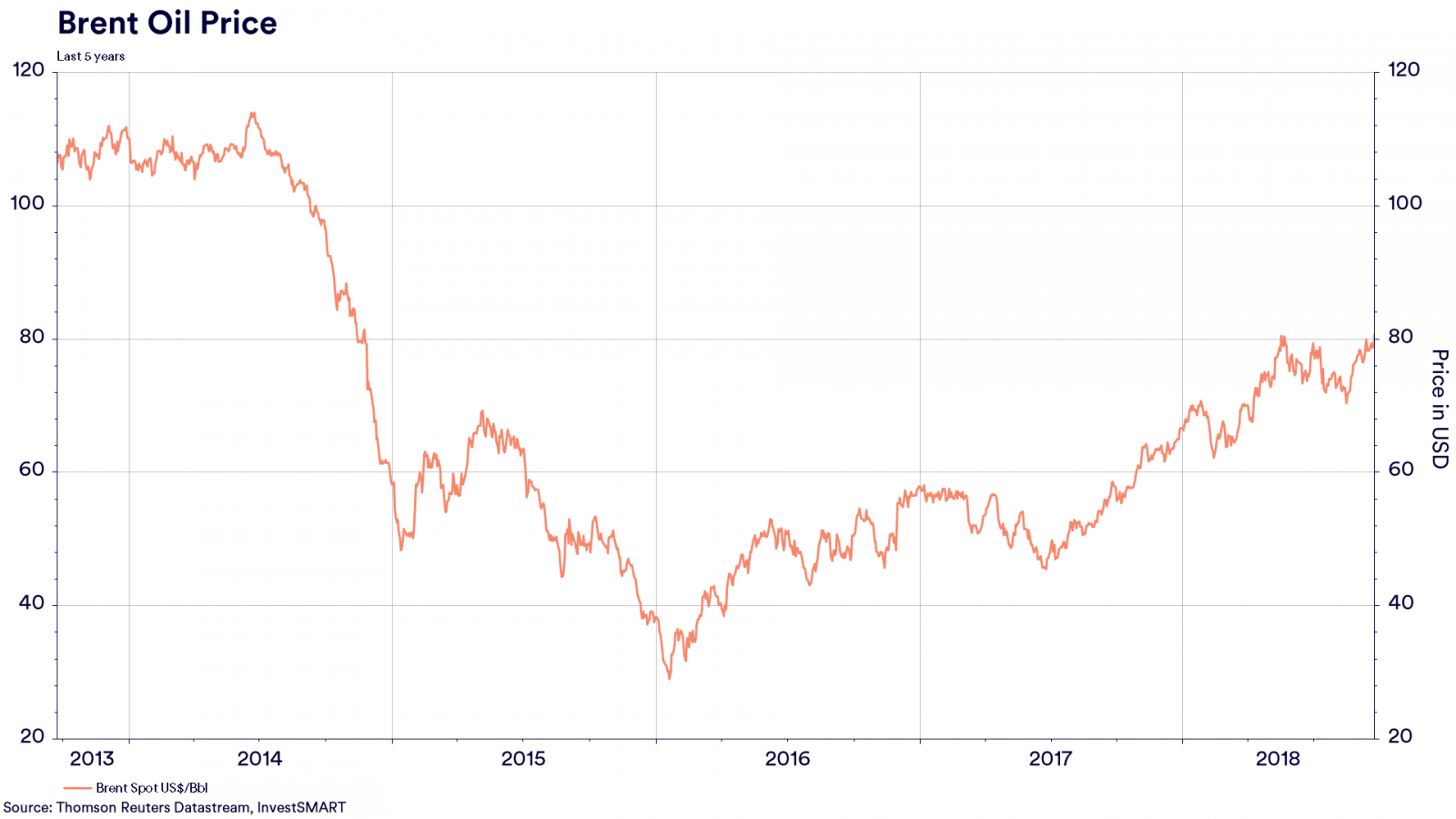Oil is heading skywards
Summary: Oil has been edging higher for a while, with predictions it could burst back through $US100 a barrel.
Key take-out: Investors in energy stocks are reaping the rewards, but there are downsides to a higher oil price.
Trade war jitters are masking a more important investment development; the seemingly unstoppable return of oil to more than $US100 a barrel.
Strong demand, coupled with supply disruptions, are combining to transport oil back to levels last seen in mid-2014 – just before it crashed in a sea of oversupply.
The effect on the Australian stock market of the oil revival has been significant, with ASX oil stocks easily the best performers over the past 12-months, and more so over the past six months as the China vs US trade war has progressively worsened.
Oil-sector leader Woodside Petroleum is up 30 per cent since this time last year to a 12-month high of $38.05, boosted this week by an oil discovery off the coast of Myanmar. Santos has done better with a rise of 80 per cent over the past 12-months, and Beach Energy has streaked up by 150 per cent.
Key ASX indices tell the same story of oil's outperformance, even as the trade war has dominated news media headlines over the past six months, with the overarching S&P/ASX 200 Energy (Sector) index up 21 per cent since mid-March. The All Ordinaries Index has risen by just 4 per cent and the ASX200 index of top stocks has crept up by 3.2 per cent.
Regular readers of Eureka Report would have been aware of the change underway in the oil market, so this week's rise in the price of Brent quality crude, the European standard, to more than $US80/bbl would not be a surprise.

A move to that level was suggested here nine months ago (Oil revival rolls on, January 22) and repeated as recently as last month (Oil revival accelerates deal flow, August 29).
But even $US80/bbl, more than double the price during the 2014 oil-price slump, is starting to look modest as the powerful forces of supply and demand drive the price towards the next target of $US100/bbl.
The impacts of higher oil
Winners in the oil sector are easy to pick. Less obvious are losers, and there will be plenty because oil remains a fundamental building block of a modern society. It affects the price of everything from airlines, which can't fly without it, to household groceries delivered by trucks. Even the daily commute to work will become more expensive.
Geopolitics too are at risk of being upended by the return of $US80/bbl oil and the march towards $US100/bbl, with the US President, Donald Trump, demanding that major oil-producing countries do more to lower the price of oil.
Unfortunately for the President his country is a major cause of the rising oil price via its strong (gas guzzling) economy and its active role in the Middle East, where it has renewed sanctions on Iran, effectively limiting oil exports from a major producer.
The oil-producers' cartel, OPEC, dismissed Trump's demand for more oil at a meeting in the Algerian capital of Algiers over the weekend, with a spokesman saying the market was well supplied and there had not been requests from customers for more oil.
“Our plan is to meet demand,” the Saudi Energy Minister, Khalid Al-Falih said.
The net result of the complex equation which lies behind the oil price is a clear warning that the rise has just started, with much higher prices ahead with or without a trade war.
JP Morgan, a big US bank, took a tentative step towards the psychologically important oil price of $US100/bbl with a forecast of $US90/bbl, which could follow the formal renewal of US sanctions on Iran in November.
HSBC, Europe's biggest bank, went a step further with a warning that oil could be heading back to $US100/bbl over the next 15 months.
“While we aren't explicitly forecasting Brent oil to rise to $US100/bbl, we see real risks of this happening,” HSBC said in a research note.
“The fact that much higher supply is already needed from the likes of Saudi Arabia, and the low levels of spare capacity remaining, leaves the global oil system highly vulnerable to any further significant outage.”
Changing dynamics
The cause of the oil-price recovery is a result of the global economy performing strongly while investment in oil exploration and project development has lagged, largely as a result of the 2014 price crash.
Both producers and major consumers are starting to adjust their forward strategies to cope with the expected continuation of the oil-price rise.
A London-based oil trader, Thibaut Remoundos, told the Financial Times newspaper that the major story about oil was not the price moving above $US80/bbl but events “at the back end of the forward curve” – trader speak for future oil-price moves.
“Hedging by oil producers in Brent-links contracts is dropping off in expectation of higher prices in the future, while major consumers such as airlines have been rushing to buy for the same reason,” Remoundos said.
“You would need to go back to 2007 to see this level of hedging by consumers.”
While strong demand in the fast-growing US economy is a major boost to oil consumption, it is US political action in the Middle East which is threatening supply.
Renewed sanctions on Iran had been expected to see the removal of between 300,000 to 700,000 barrels of oil a day from the market, a forecast which has been revised to a possible 1.5 million barrels a day.
Daniel Jaeggi, co-founder of the commodity trading business Mercuria, told the Reuters news agency that the market did not have a supply response to the potential disappearance of such a large amount of oil in the fourth quarter.
“In my view, that makes it conceivable to see a price spike north of $US100/bbl,” Jaeggi said.
What to expect
For Australian investors the rising oil price is a double-edged sword. Good news for oil explorers and producers. Bad news for oil consumers, a group that includes every industry as well as households.
In the past, strong and rising oil prices have had a dulling effect on the Australian economy and have played a role in the Reserve Bank's interest rate settings to ease pressure on home buyers who are facing higher fuel bills.
Four years of depressed prices will have caused some investors and households to forget the importance of oil in every aspect of the economy – but they're about to get a powerful reminder.









